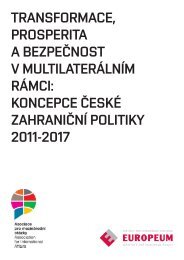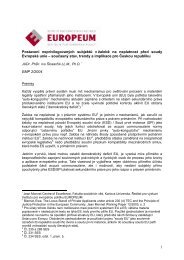eu constitutionalisation - EUROPEUM Institute for European Policy
eu constitutionalisation - EUROPEUM Institute for European Policy
eu constitutionalisation - EUROPEUM Institute for European Policy
You also want an ePaper? Increase the reach of your titles
YUMPU automatically turns print PDFs into web optimized ePapers that Google loves.
Chapter 8: EU Development <strong>Policy</strong> in the Constitutional Treaty: a Step <strong>for</strong>ward?g Section 1: Development cooperationg Section 2: Economic, financial and technical cooperation with thirdcountriesg Section 3: Humanitarian aidUn<strong>for</strong>tunately, development cooperation has not been included in the titleof Chapter IV. It is a worrying signal, taking into account that the Unionand its member states are the biggest donor of development assistanceworldwide. Moreover, in the Section about development cooperation,the scope of development cooperation is not explicitly extended to alldeveloping countries as defined by the OECD-DAC, and there is nospecial emphasis placed on assistance to the most disadvantaged or LeastDeveloped Countries¹⁵. Such provisions, which were postulated by<strong>European</strong> NGOs, would strengthen EU development policy’s profile, EUinternational credibility and its commitment to adherence to internationalstandards and targets. Last but not least, it would ensure clarity in thetreaty. Defining the economic, financial and technical cooperation withthird countries, as referred to in Section 2 in Article III-319, as cooperationwith third countries other than developing countries is only a partial solution.Development practitioners also regret not considering the principles ofparticipation, ownership and partnership as relevant in developmentpolicy¹⁶. That compliance with the approach promoted, <strong>for</strong> example, inthe relationships with ACP countries in the Cotonou Agreement wouldpave the way <strong>for</strong> new standards in development cooperation.The completely new Article III-321 on humanitarian aid defines it as ad-hocassistance, intended to provide relief and protection <strong>for</strong> people in third countries whoare victims of natural or man-made disasters in order to meet the humanitarianneeds. As the Treaty states only, that assistance should be conducted withinthe framework of objectives of the external actions of the Union, the NGOspoint out that a stronger commitment to the principle of solidarity andneeds-based aid direct to beneficiaries would be more adequate, especiallyin such a sensible area as humanitarian aid¹⁷. However, this is ensured byincluding the principles of international law, n<strong>eu</strong>trality, impartiality andnon-discrimination in point 2. Finally, the provisions on establishmentof <strong>European</strong> Voluntary Humanitarian Aid Corps are to be judged as at15) MACKIE, BASER, FREDERIKSEN and HASSE (2003), p. 14.16) Ibid.17) See: CIVIL SOCIETY CONTACT GROUP, p. 5.288Chapter 8: EU Development <strong>Policy</strong> in the Constitutional Treaty: a Step <strong>for</strong>ward?least controversial. As correctly pointed out by NGOs, humanitarian aidfunctions in emergency contexts such as war and natural disaster whereknow-how and quick reactions are essential, and dangerous, horrific andtraumatising events are the norm. It is a setting <strong>for</strong> experienced, trainedprofessionals and Voluntary Corps might be more appropriate in the contextof long-term development cooperation¹⁸.Three Cs – enhancement or only repetition?The constitutional treaty repeats in Article III-316 the Maastricht Treatyrequirements <strong>for</strong> complementarity between the development policies ofthe Union and the member states. Moreover, it states that they shall notonly complement but also, what is new, rein<strong>for</strong>ce each other.As far as coherence is concerned, the provisions from Article 178 TEC arerecalled word <strong>for</strong> word as in the Nice Treaty: The Union shall take account ofthe objectives of development cooperation in the policies that it implements whichare likely to affect developing countries.Article III-318 requires the member states and the Union to coordinatetheir ef<strong>for</strong>ts in order to promote the complementarity and efficiency inthe field of development cooperation. Article III-321 repeats the same <strong>for</strong>humanitarian aid.The consistency and coherence of both are furthered by the requirementof compliance with international commitments. In both cases, theCommission may take any useful initiative to promote the coordination.These provisions do not bring an upgrade of the coherence’s concept, oftenpostulated by those interested in the development issues. However, amongthe general provisions some can contribute to the better implementationof the three Cs. For instance, Article I-1 provides the Union <strong>for</strong> coordinationof member states policies. Article I-5 requires the member states tocooperate in order to facilitate the achievement of the Union’s tasks and refrainfrom any measure which could jeopardise the attainment of the Union’s objectives.The single legal personality <strong>for</strong> the EU allows <strong>for</strong> more coherence and morecredibility in international <strong>for</strong>ums (Article I-7).18) Ibid., p. 6.289








